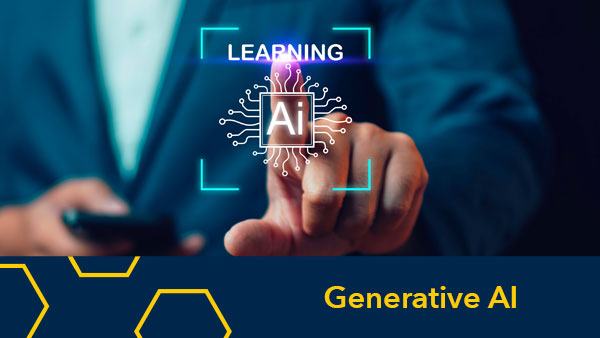This piece originally ran on Inside Higher Ed’s Learning Innovation blog. Visit the blog for more insight, conversation and debate about learning and technology from industry leaders
By Edward J. Maloney and Joshua Kim

We’ve been longtime fans of the Center for Academic Innovation at the University of Michigan. CAI’s founding executive director, Associate Vice Provost for Academic Innovation James DeVaney, is a good friend and frequent collaborator.
We, therefore, were grateful for the opportunity to ask some questions of one of CAI’s recent recruits, Learning Experience Designer Jacob Aguinaga. Jacob graciously agreed to answer our questions about his role, his professional career path and his advice for others thinking about crafting a higher education career as a nonfaculty educator.
Q: Your title is learning experience designer. How is learning experience design different from more common designations such as instructional design or learning design?
A: This is certainly a question that has sparked some spirited conversations of late within the larger instructional design community, including within our learning experience design team at CAI. My perspective is largely informed by my past professional experiences and my education in a learning experience design certificate program during my master’s degree coursework.
To me, learning experience design is unique in its focus on learners’ needs as a driver for design decisions. Considering the entirety of the educational landscape, there has historically been a tendency to focus on what content is essential for learners to know, from K-12 settings through higher education institutions. This approach may center learners’ needs at times, but this is more often in terms of what content knowledge learners need to master a subject. This approach is problematic because it assumes that content can be objectively important, when in reality all learners have different needs, desires and goals, making the importance of content a subjective matter. I see the learning experience design perspective as a way to refine the subjectivity of content importance and instructional delivery in an effort to develop a meaningful, applicable learning experience.
In my team’s work, we go to great lengths to gain insights into what our learners are looking to gain from a prospective online course, what their background knowledge might be, how they might engage with a course and what barriers learners may need to navigate. Designing from a learning experience perspective then takes this portrait of our prospective learners and uses it to inform decisions about what instructional content is most relevant, what kinds of learning sequences will be most ideal, and what types of scaffolds learners will benefit from most. Equipped with this understanding, we then leverage the capabilities of our given learning management system and other educational tools to develop a learning experience that enables learners to meaningfully engage with the course content and make use of what they learn.
Q: Prior to your role as a learning experience designer, you were a middle school science teacher. What has been your career path to CAI?
A: I began my career as a classroom teacher. I attended the University of Michigan for my undergraduate studies and graduated from the university’s School of Education with a degree in secondary education in 2013. I earned my teaching certificate as part of my coursework, certifying me to teach history and earth/space science, and upon graduating, I accepted a teaching position as a high school science teacher in Indiana. After two years, I made the decision to move back to Michigan. My wife had begun her medical school education at Central Michigan University, so I used that opportunity to complete coursework that enabled me to earn a social studies teaching certification. After a couple of moves for my wife’s various training rotations, I accepted a teaching position as a middle school teacher, again teaching a variety of science courses.
After holding my middle school position for two years, I decided to return to school with the intention of studying curriculum development. I was accepted to the University of Michigan’s School of Education once again, and while visiting the school to learn more about their graduate programs, I heard about a new learning experience design certificate program. The program blended my desire to learn about curriculum development with my interest in learning technologies and innovative ways to deliver content. I decided to apply to the certificate program and work towards it in tandem with my coursework in the educational studies design and technologies for learning across culture and contexts concentration.
The certificate program required the completion of 180 internship hours at the Center for Academic Innovation working alongside and learning from the learning experience design team. Through this valuable and enriching experience, I saw how the theories and pedagogical principles I studied in my graduate program coupled with insights I gained from teaching could be leveraged to develop thoughtful learning experiences for a global online audience. I enjoyed the work I got to be a part of so much that when the Center for Academic Innovation put up a job posting for a full-time learning experience designer, I decided to apply. I was lucky enough to receive the job offer, and upon receiving my master’s degree in May 2020, I started work at CAI as a full-time learning experience designer, and I’ve been here ever since.
Q: Do you have any advice for those who might be interested in a nonfaculty educator career? What do you see as the opportunities for those interested in teaching and learning but who are not interested in pursuing a traditional academic training path?
A: I would encourage people to recognize that faculty positions are not the only way one can contribute to the learning being facilitated by colleges and universities. Since my first day on the University of Michigan’s campus, it had been my dream to one day work for the university, but I had no idea how I’d make that happen, as faculty positions are so prestigious and scarce relative to the number of scholars out there.
As my career path took shape, I realized that I was knowledgeable and had developed skills that could assist subject-matter experts in developing learner experiences that had the potential to change learners’ lives. Anyone who is interested in being an educator, whether a faculty member or not, should take the time to strengthen their understanding of learning theory and pedagogical practices, as they are immensely valuable and will enable you to not only craft meaningful learning experiences but to tailor those experiences to empower learners to make practical use of them.
Additionally, my team is excited to begin work on a new MOOC series called An Introduction to Learning Design. It was recently approved as part of the Center for Academic Innovation’s fall 2021 call for proposals and will be designed and launched in 2022. This new series will provide learners with a foundational understanding of the field, including design approaches, theories of learning and the core competencies expected of professional learning experience designers. Even if you might not be interested in learning experience design as a profession, I would still encourage you to give the series a look. The theories and approaches we work from can apply to a number of contexts!


